2004年八级试卷及答案
2004年专八口语试题答案
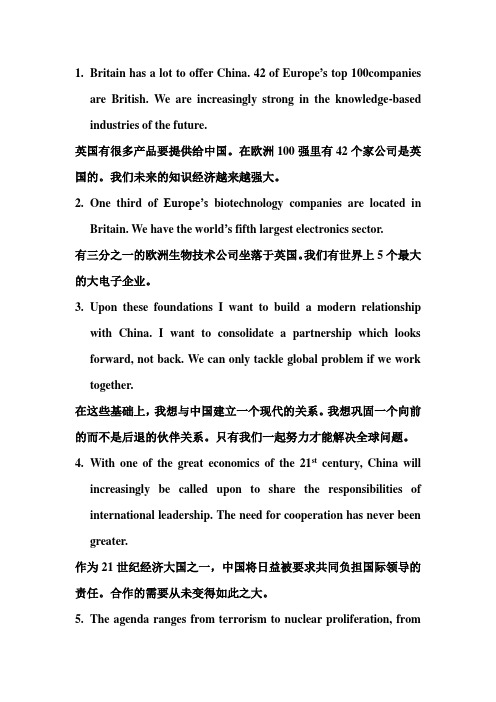
1.Britain has a lot to offer China. 42 of Europe’s top 100companiesare British. We are increasingly strong in the knowledge-based industries of the future.英国有很多产品要提供给中国。
在欧洲100强里有42个家公司是英国的。
我们未来的知识经济越来越强大。
2.One third of Europe’s biotechnology companies are located inBritain. We have the world’s fifth largest electronics sector.有三分之一的欧洲生物技术公司坐落于英国。
我们有世界上5个最大的大电子企业。
3.Upon these foundations I want to build a modern relationshipwith China. I want to consolidate a partnership which looks forward, not back. We can only tackle global problem if we work together.在这些基础上,我想与中国建立一个现代的关系。
我想巩固一个向前的而不是后退的伙伴关系。
只有我们一起努力才能解决全球问题。
4.With one of the great economics of the 21st century, China willincreasingly be called upon to share the responsibilities of international leadership. The need for cooperation has never been greater.作为21世纪经济大国之一,中国将日益被要求共同负担国际领导的责任。
2003-2004学年度八年级第一学期期末检测

2003-2004学年度第一学期期末检测八年级语文试卷试卷满分120分,考试时间120分钟。
第I卷(选择题共23分)1.下列加点字的读音完不全正确的一组是()A.严峻.竣.工疏浚.英俊.B.田畴.筹.备踌.躇帱.帐C.概.况感慨.灌溉.遗骸.D.屏幕.暮.色羡慕.招募.2.下列词语书写无误的一组是___。
(2分)A.意兴阑珊伛偻提携汗出夹背脱笼之鹄B.朝辉夕阴心旷神怡惨绝人寰望文生义C.适缝其会袖手旁观平淡无奇迎刃而解D.慷慨无私嗟来之食峥嵘岁月岿然不动3.依次填入下列空格处的比喻,最恰当的一项是()春联,是文学殿堂里一枝奇葩,它发自千人之心,出自万人之手,各展其才,各显千秋,豪放,婉约,粗犷,细腻,洋洋洒洒,蔚为大观。
A.如旭喷薄似风拂杨柳如小桥流水若大江东去B.若大江东去如小桥流水如旭日喷薄似风拂杨柳C.如小桥流水似风拂杨柳若大江东去如旭日喷薄D.似风拂杨柳如小桥流水如旭日喷薄若大江东去4.选出加点词语意思相同的一组()A.①小张当了劳动模范,我们全村都很光彩..。
②在所有申办2008年奥运会的城市中,北京有如光彩..夺目的明珠,备受评审团的青睐。
B.①他回到家就感到鼻塞、头痛,身体发热..。
②当时我头脑发热..,失去理智,不顾一切地冲了上去。
C.①他的穿着虽然朴素..,但很整洁。
这本书介绍的是古代朴素..的唯物主义哲学思想。
D.①1921年孙中山就任非常..大总统。
②他终于安然度过了那段白色恐怖的非常..时期。
5.成语运用正确的一项是()A.集邮能开阔眼界,陶冶身心,集邮不仅需要恒心,还需要学识。
不管什么时期,什么国家的邮票,都要敝帚自珍....。
B.每天下班,看到妻子已经将饭菜盛好摆放在餐桌上,老张总会产生出一处宾至如归....的感觉。
C.为了一道题,我花了整整半天时间,真是碌碌无为....。
D.由于一家小酒店招牌的启发,法国大作家左拉终于为自己小说中的女主人公找到了名字,真可谓妙手偶得....。
八年级物理2004
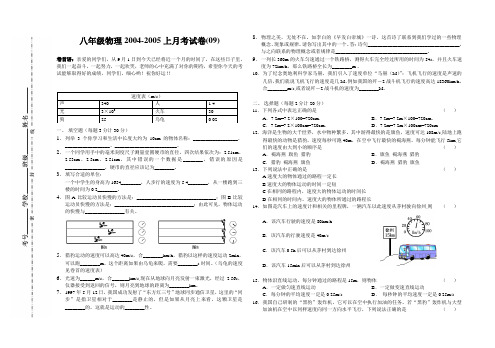
八年级物理2004-2005上月考试卷(09)卷首语:亲爱的同学们,从9月1日到今天已经将近一个月的时间了,在这些日子里,我们一起奋斗,一起努力,一起欢笑,老师的心中充满了对你的期待,希望你今天的考试能够取得好的成绩,同学们,细心哟!祝你好运!!一、 填空题(每题3分计30分)1.列举3个你学习和生活中长度大约为10cm 的物体名称:__________________、__________________、_________________________。
2.一个同学用手中的毫米刻度尺子测量壹圆硬币的直径,四次结果依次为:2.51cm 、2.53cm 、2.5cm 、2.51cm ,其中错误的一个数据是________,错误的原因是________________,硬币的直径应该记为________。
3.填写合适的单位:一个中学生的身高为1654________,人步行的速度为5.4________,从一楼跑到三 楼的时间为0.2________。
4.图A 比较运动员快慢的方法是:________________________________;图B 比较运动员快慢的方法是:________________________________;由此可见,物体运动的快慢与________________有关。
5.猎豹运动的速度可以高达40m/s ,合________km/h ,猎豹以这样的速度运动2min ,可以跑________m 。
这个距离如果由乌龟来爬,需要________s 时间。
(乌龟的速度见卷首的速度表)6.光速为______m/s ,合_______km/s,现在从地球向月亮发射一束激光,经过2.56s ,仪器接受到返回的信号,则月亮到地球的距离为________km 。
7.1997年5月12日,我国成功发射了“东方红三号”地球同步通信卫星,这里的“同步”是指卫星相对于________是静止的,但是如果从月亮上来看,这颗卫星是________的,这就是运动的________性。
2004年英语专业八级考试翻译试卷及参考译文
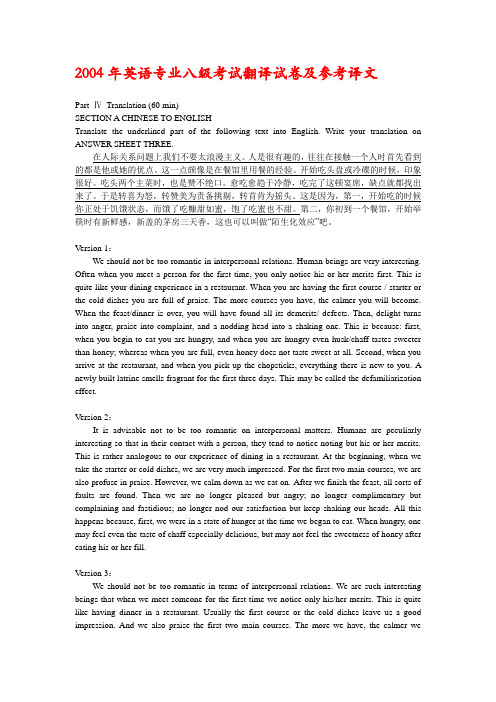
2004年英语专业八级考试翻译试卷及参考译文Part ⅣTranslation (60 min)SECTION A CHINESE TO ENGLISHTranslate the underlined part of the following text into English. Write your translation on ANSWER SHEET THREE.在人际关系问题上我们不要太浪漫主义。
人是很有趣的,往往在接触一个人时首先看到的都是他或她的优点。
这一点颇像是在餐馆里用餐的经验。
开始吃头盘或冷碟的时候,印象很好。
吃头两个主菜时,也是赞不绝口。
愈吃愈趋于冷静,吃完了这顿宴席,缺点就都找出来了。
于是转喜为怒,转赞美为责备挑剔,转首肯为摇头。
这是因为,第一,开始吃的时候你正处于饥饿状态,而饿了吃糠甜如蜜,饱了吃蜜也不甜。
第二,你初到一个餐馆,开始举筷时有新鲜感,新盖的茅房三天香,这也可以叫做“陌生化效应”吧。
Version 1:We should not be too romantic in interpersonal relations. Human beings are very interesting. Often when you meet a person for the first time, you only notice his or her merits first. This is quite like your dining experience in a restaurant. When you are having the first course / starter or the cold dishes you are full of praise. The more courses you have, the calmer you will become. When the feast/dinner is over, you will have found all its demerits/ defects. Then, delight turns into anger, praise into complaint, and a nodding head into a shaking one. This is because: first, when you begin to eat you are hungry, and when you are hungry even husk/chaff tastes sweeter than honey; whereas when you are full, even honey does not taste sweet at all. Second, when you arrive at the restaurant, and when you pick up the chopsticks, everything there is new to you. A newly built latrine smells fragrant for the first three days. This may be called the defamiliarization effect.Version 2:It is advisable not to be too romantic on interpersonal matters. Humans are peculiarly interesting so that in their contact with a person, they tend to notice noting but his or her merits. This is rather analogous to our experience of dining in a restaurant. At the beginning, when we take the starter or cold dishes, we are very much impressed. For the first two main courses, we are also profuse in praise. However, we calm down as we eat on. After we finish the feast, all sorts of faults are found. Then we are no longer pleased but angry; no longer complimentary but complaining and fastidious; no longer nod our satisfaction but keep shaking our heads. All this happens because, first, we were in a state of hunger at the time we began to eat. When hungry, one may feel even the taste of chaff especially delicious, but may not feel the sweetness of honey after eating his or her fill.Version 3:We should not be too romantic in terms of interpersonal relations. We are such interesting beings that when we meet someone for the first time we notice only his/her merits. This is quite like having dinner in a restaurant. Usually the first course or the cold dishes leave us a good impression. And we also praise the first two main courses. The more we have, the calmer webecome. By the end of the feast/dinner, all the demerits/shortcomings of the dishes are found out. And delight turns into anger, praise into complaint, and approval into disapproval. The reasons for the change are: first, when we begin to eat, even husk/chaff seems sweeter than honey as we are hungry; whereas when we are full, honey does not taste sweet at all. Second, when we begin to eat upon arrival, everything in the restaurant appears new, even a new latrine smells fragrant. The defamiliarization effect, isn’t it?Hunger is the best sauce.SECTION B ENGLISH TO CHINESETranslate the underlined part of the following text into Chinese. Write your translation on ANSWER SHEET THREE.For me the most interesting thing about a solitary life, and mine has been that for the last twenty years, is that it becomes increasingly rewarding. When I can wake up and watch the sun rise over the ocean, as I do most days, and know that I have an entire day ahead, uninterrupted, in which to write a few pages, take a walk with my dog, read and listen to music, I am flooded with happiness.I’m lonely only when I am overtired, when I have worked too long without a bre ak, when for the time being I feel empty and need filling up. And I am lonely sometimes when I come back home after a lecture trip, when I have seen a lot of people and talked a lot, and am full to the brim with experience that needs to be sorted out.Then for a little while the house feels huge and empty, and I wonder where my self is hiding. It has to be recaptured slowly by watering the plants and perhaps, by looking again at each one as though it were a person.It takes a while, as I watch the surf blowing up in fountains, but the moment comes when the world falls away, and the self emerges again from the deep unconscious, bringing back all I have recently experienced to be explored and slowly understood.我在过去的二十年间一直单独生活。
20042005学年度下学期八年级综合测试题
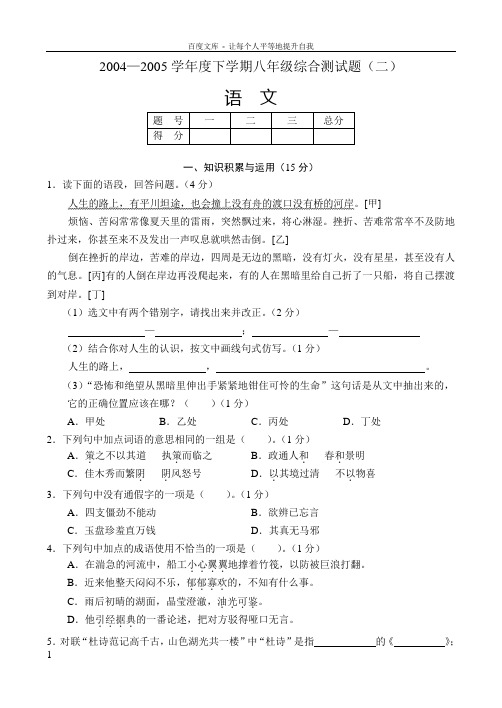
2004—2005学年度下学期八年级综合测试题(二)语文一、知识积累与运用(15分)1.读下面的语段,回答问题。
(4分)人生的路上,有平川坦途,也会撞上没有舟的渡口没有桥的河岸。
[甲]烦恼、苦闷常常像夏天里的雷雨,突然飘过来,将心淋湿。
挫折、苦难常常卒不及防地扑过来,你甚至来不及发出一声叹息就哄然击倒。
[乙]倒在挫折的岸边,苦难的岸边,四周是无边的黑暗,没有灯火,没有星星,甚至没有人的气息。
[丙]有的人倒在岸边再没爬起来,有的人在黑暗里给自己折了一只船,将自己摆渡到对岸。
[丁](1)选文中有两个错别字,请找出来并改正。
(2分)—;—(2)结合你对人生的认识,按文中画线句式仿写。
(1分)人生的路上,,。
(3)“恐怖和绝望从黑暗里伸出手紧紧地钳住可怜的生命”这句话是从文中抽出来的,它的正确位置应该在哪?()(1分)A.甲处B.乙处C.丙处D.丁处2.下列句中加点词语的意思相同的一组是()。
(1分)A.策.之不以其道执策.而临之B.政通人和.春和.景明C.佳木秀而繁阴.阴.风怒号D.以.其境过清不以.物喜3.下列句中没有通假字的一项是()。
(1分)A.四支僵劲不能动B.欲辨已忘言C.玉盘珍羞直万钱D.其真无马邪4.下列句中加点的成语使用不恰当的一项是()。
(1分)A.在湍急的河流中,船工小心翼翼....地撑着竹筏,以防被巨浪打翻。
B.近来他整天闷闷不乐,郁郁寡欢....的,不知有什么事。
C.雨后初晴的湖面,晶莹澄澈,油光可鉴....。
D.他引经据典....的一番论述,把对方驳得哑口无言。
5.对联“杜诗范记高千古,山色湖光共一楼”中“杜诗”是指的《》;“范记”是指的《》,“一楼”是指位于省的楼。
(3分)6.默写。
(5分)(1)冰霜正惨凄,。
(刘桢《赠从弟》)(2)天街小雨润如酥,。
(韩愈《早春呈水部张十八员外》)(3),月如钩。
(李煜《相见欢》)(4)最喜小儿亡赖,。
(辛弃疾《清平乐村居》)(5),自缘身在最高层。
2004-2005学年度第一学期八年级物理期末考试试题-带答案
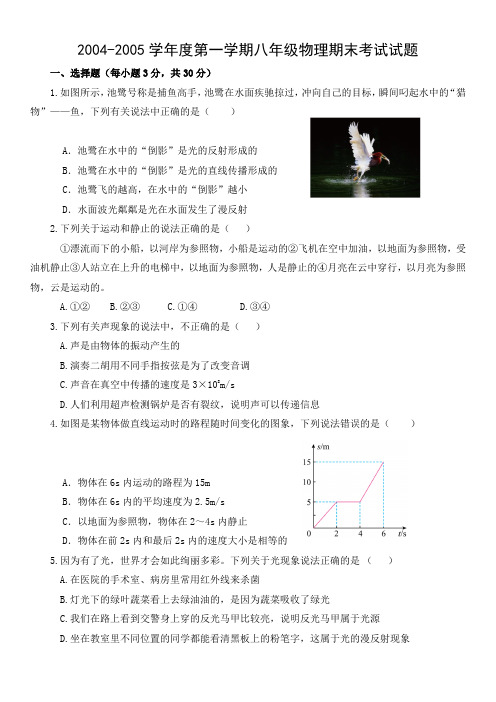
2004-2005学年度第一学期八年级物理期末考试试题一、选择题(每小题3分,共30分)1.如图所示,池鹭号称是捕鱼高手,池鹭在水面疾驰掠过,冲向自己的目标,瞬间叼起水中的“猎物”——鱼,下列有关说法中正确的是()A.池鹭在水中的“倒影”是光的反射形成的B.池鹭在水中的“倒影”是光的直线传播形成的C.池鹭飞的越高,在水中的“倒影”越小D.水面波光粼粼是光在水面发生了漫反射2.下列关于运动和静止的说法正确的是()①漂流而下的小船,以河岸为参照物,小船是运动的②飞机在空中加油,以地面为参照物,受油机静止③人站立在上升的电梯中,以地面为参照物,人是静止的④月亮在云中穿行,以月亮为参照物,云是运动的。
A.①②B.②③C.①④D.③④3.下列有关声现象的说法中,不正确的是()A.声是由物体的振动产生的B.演奏二胡用不同手指按弦是为了改变音调C.声音在真空中传播的速度是3×108m/sD.人们利用超声检测锅炉是否有裂纹,说明声可以传递信息4.如图是某物体做直线运动时的路程随时间变化的图象,下列说法错误的是()A.物体在6s内运动的路程为15mB.物体在6s内的平均速度为2.5m/sC.以地面为参照物,物体在2~4s内静止D.物体在前2s内和最后2s内的速度大小是相等的5.因为有了光,世界才会如此绚丽多彩。
下列关于光现象说法正确的是()A.在医院的手术室、病房里常用红外线来杀菌B.灯光下的绿叶蔬菜看上去绿油油的,是因为蔬菜吸收了绿光C.我们在路上看到交警身上穿的反光马甲比较亮,说明反光马甲属于光源D.坐在教室里不同位置的同学都能看清黑板上的粉笔字,这属于光的漫反射现象6.我国成功发射了世界首颗量子科学实验卫星“墨子号”。
第一次用科学方法解释了光沿直线传播,促进量子通信发展,下列各光现象与此原理不同是()A. 月食B. 小孔成像C. 阳光透过树林时留下树的影子D. 水中倒影7.有关宇宙和粒子,下列说法正确的是()A.质子、原子、电子是按照尺度由大到小的顺序排列的B.地球绕太阳运动,说明太阳是宇宙的中心C.原子由原子核和电子组成D.质子是微观世界中最小的粒子8.下列说法中正确的是()A.一支粉笔分成了体积相等的两段后,粉笔的密度变为原来的一半B.密度不同的两个物体,其体积一定不同C.金的密度为19.3×103kg/m3,表示1m3的金的质量为19.3×103kgD.铁块的密度比木块的密度大,表示铁的质量大于木块的质量9.小浩分别测出A、B两种不同物质的质量和体积,并绘制m-V图像,如图,则()A. 物质A、B的密度之比是6:1B. 物质A的密度随体积增大而增大C. 水的m-V图像应该位于区域ⅠD. 当A和B两物质的体积相同时,B物质的质量较大10.下列关于测量工具的说法中,错误的是()A.刻度尺在读数时,视线要与尺面垂直B.选用更精密的测量仪器,就可以减小误差C.量筒读数时,视线要与凹液面最低处相平D.测量物体质量时,右盘下沉,要向左调节平衡螺母二、填空题(每空1分,共14分)11.石墨烯被称为“黑金”、“新材料之王”,科学家甚至预言石墨烯将“彻底改变21世纪”。
2004年秋季八年级(上)期末考试
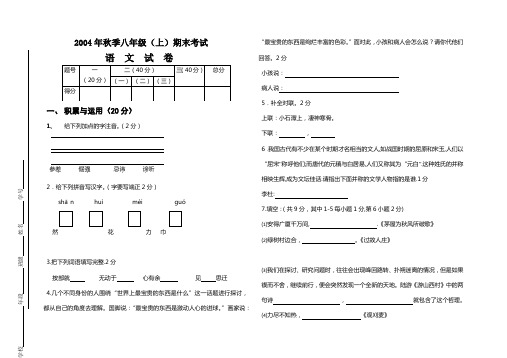
学校 年段 班级 姓名 学号2004年秋季八年级(上)期末考试 语 文 试 卷一、 积累与运用(20分)1、 给下列加点的字注音。
(2分)参差. 倔强. 忌讳. 谛.听 2.给下列拼音写汉字。
(字要写端正2分)sh ān hu ì m èi gu ó花力 巾3.把下列词语填写完整.2分按部就 无动于 心有余 见 思迁4.几个不同身份的人围绕“世界上最宝贵的东西是什么”这一话题进行探讨,都从自己的角度去理解。
国脚说:“最宝贵的东西是激动人心的进球。
”画家说:“最宝贵的东西是绚烂丰富的色彩。
”面对此,小孩和病人会怎么说?请你代他们回答。
2分小孩说:病人说:5.补全对联。
2分上联:小石潭上,凄神寒骨。
下联: ,6.我国古代有不少在某个时期才名相当的文人,如战国时期的屈原和宋玉,人们以“屈宋”称呼他们;而唐代的元稹与白居易,人们又称其为“元白”.这种姓氏的并称相映生辉,成为文坛佳话.请指出下面并称的文学人物指的是谁.1分李杜:7.填空:(共9分,其中1-5每小题1分,第6小题2分)⑴安得广厦千万间, .《茅屋为秋风所破歌》⑵绿树村边合, 。
《过故人庄》⑶我们在探讨、研究问题时,往往会出现峰回路转、扑朔迷离的情况,但是如果锲而不舍,继续前行,便会突然发现一个全新的天地。
陆游《游山西村》中的两句诗 , 就包含了这个哲理。
⑷力尽不知热, 《观刈麦》 ⑸ ,铜雀春深锁二乔.《赤壁》 ⑹人生自古谁无死, 。
《过零丁洋》 ⑺.落红不是无情物, 。
《己亥杂诗》⑻.故天将降大任于是人也,必先 , ,饿其体肤, , ,所以动心忍性,曾益其所不能.《生于忧患,死于安乐》二.阅读题(40分)(一)最美的眼神①一所重点中学百年校庆时,恰逢德高望重的老教师雒(lu ò)老八十寿辰。
雒老师一生极富传奇色彩,他所教过的学生,许多已成为蜚声海内外的教授、学者以及活跃在时代前沿的IT精英。
是什么原因使雒老师桃李满天下呢?学校决定在百年校庆之际,把这个谜底揭开。
局解】2004八年制(A卷)
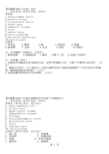
子宫借韧带、阴道、尿道生殖膈和盆底肌等保持其正常的位置。子宫阔韧带(0.5):子宫圆韧带(0.5):子宫主韧带(0.5):骶子宫韧带(0.5):
子宫动脉起自髂内动脉的前干(2)。
4. 试述甲状腺的位置、重要毗邻及血液供应(10分)。
参考答案及评分标准
名词解释
1.左膈神经、左迷走神经和左肺动脉围成动脉导管三角(3),内有动脉韧带、左喉返神经和心浅丛(2)。
2.颈深筋膜浅层在距胸骨上缘3~4cm处,分为深、浅两层,向下分别附于胸骨柄前、后缘,两层之间是胸骨上间隙(3)。内有颈静脉弓、颈前静脉下段、胸锁乳突肌胸骨头等(2)。
6.pleua
7.omental bursa
8.pelvis diaphragm
9.epicranial aponeurosis
10.parotid gland
汉译英
1.四边孔 2.腘窝 3.膈 4.收肌管 5.纵隔
【局解】07级临床法医标本考试
头皮(皮肤、浅筋膜、帽状腱膜)
腰下三角
腹股沟管(精索或子宫圆韧带)
腹股沟三角(腹壁下动脉)
肱骨肌管(桡神经、肱深动脉)
直肠子宫陷凹
甲状腺上动脉(颈外动脉)
脾动脉
四边孔(旋肱后动脉、腋神经)
心包斜窦
【局解】2009年上学期5年制局部解剖学试题(主观题完整版)
9. Inguinal canal
10. Parotid gland
汉译英(每个0.25分,共2.5分)
1.股三角 6. 网膜囊
- 1、下载文档前请自行甄别文档内容的完整性,平台不提供额外的编辑、内容补充、找答案等附加服务。
- 2、"仅部分预览"的文档,不可在线预览部分如存在完整性等问题,可反馈申请退款(可完整预览的文档不适用该条件!)。
- 3、如文档侵犯您的权益,请联系客服反馈,我们会尽快为您处理(人工客服工作时间:9:00-18:30)。
PART II READING COMPREHENSION (30 MIN.) (Score: )2004 TEXT AFarmers in the developing world hate price fluctuations. It makes it hard to plan ahead. But most of them have little choice: they sell at the price the market sets. Farmers in Europe, the U.S. and Japan are luckier: they receive massive government subsidies in the form of guaranteed prices or direct handouts. Last month U.S. President Bush signed a new farm bill that gives American farmers $190 billion over the next 10 years, or $83 billion more than they had been scheduled to get, and pushes U.S. agricultural support close to crazy European levels. Bush said the step was necessary to “promote farmer independence and preserve the farm way of life for generations”. It is also designed to help the Republican Party win control of the Senate in November’s mid-term elections.Agricultural production in most poor countries accounts for up to 50% of GDP, compared to only 3% in rich countries. But most farmers in poor countries grow just enough for themselves and their families. Those who try exporting to the West find their goods whacked with huge tariffs or competing against cheaper subsidized goods. In 1999 the United Nations Conference on Trade and Development concluded that for each dollar developing countries receive in aid they lose up to $14 just because of trade barriers imposed on the export of their manufactured goods. It’s not as if the developing world wants any favours, says Gerald Ssendwula, Uganda’s Minister of Finance. “What we want is for the rich countries to let us compete.”Agriculture is one of the few areas in which the Third World can compete. Land and labour are cheap, and as farming methods develop, new technologies should improve output. This is no pie-in-the-sky speculation. The biggest success in Kenya’s economy over the past decade has been the boom in exports of cut flowers and vegetables to Europe. But that may all change in 2008, when Kenya will be slightly too rich to qualify for the “least developed country” status that allows African producers to avoid paying stiff European import duties on selected agricultural products. With trade barriers in place, the horticulture industry in Kenya will shrivel as quickly as a discarded rose. And while agriculture exports remain the great hope for poor countries, reducing trade barriers in other sectors also works: Americas African Growth and Opportunity Act, which cuts duties on exports of everything from handicrafts to shoes, has proved a boon to Africa’s manufacturers. The lesson: the Third World can prosper if the rich world gives it a fair go.This is what makes Bush’s decision to increase farm subsidies last month all the more depressing. Poor countries have long suspected that the rich world urges trade liberalization only so it can wangle its way into new markets. Such suspicions caused the Seattle trade talks to break down three years ago. But last November members of the World Trade Organization, meeting in Doha, Qatar, finally agreed to a new round of talks designed to open up global trade in agriculture and textiles. Rich countries assured poor countries, that their concerns were finally being addressed. Bush’s handout last month makes a lie of America’s commitment to those talks and his personal devotion to free trade.16. By comparison, farmers ____ receive more government subsidies than others.A. in the developing worldB. in JapanC. in EuropeD. in America17. In addition to the economic considerations, there is a ____ motive behind Bush’s signing of thenew farm bill.A. partisanB. socialC. financialD. cultural18. The message the writer attempts to convey throughout the passage is that ____.A. poor countries should be given equal opportunities in tradeB. “the least developed country” status benefits agricultural countriesC. poor countries should remove their suspicions about trade liberalizationD. farmers in poor countries should also receive the benefit of subsidies19. The writer’s attitude towards new farm subsidies in the U.S. is ____.A. favourableB. ambiguousC. criticalD. reservedTEXT BOscar Wilde said that work is the refuge of people who have nothing better to do. If so, Americans are now among the world’s saddest refugees. Factory workers in the United States are working longer hours than at any time in the past half century. America once led the rich world in cutting the average working week—from 70 hours in 1850 to less than 40 hours by the 1950s. It seemed natural that as people grew richer they would trade extra earnings for more leisure. Since the 1970s, however, the hours clocked up by American workers have risen, to an average of 42 this year in manufacturing.Several studies suggest that something similar is happening outside manufacturing: Americans are spending more time at work than they did 20 years ago. Executives and lawyers boast of 80 hour weeks. On holiday, they seek out fax machines and phones as eagerly as Germans bag the best sun loungers. Yet working time in Europe and Japan continues to fall. In Germany’s engineering industry the working week is to be trimmed from 36 to 35 hours next year. Most Germans get six weeks’ paid annual holiday; even the Japanese now take three weeks. Americans still make do with just two.Germany responds to this contrast with its usual concern about whether people’s aversion to work is damaging its competitiveness. Yet German workers, like the Japanese, seem to be acting sensibly: as their incomes rise, they can achieve a better standard of living with fewer hours of work. The puzzle is why America, the world’s richest country, sees things differently. It is a puzzle with sinister social implications. Parents spend less time with their children, who may be left alone at home for longer. Is it just a coincidence that juvenile crime is on the rise?Some explanations for America’s time at work fail to stand up to scrutiny. One blames weak trade unions that leave workers open to exploitation. Are workers being forced by cost cutting firms to toil harder just to keep their jobs? A recent study by two American economists, Richard Freeman and Linda Bell, suggests not: when asked, Americans actually want to work longer hours. Most German workers, in contrast, would rather work less.Then, why do Americans want to work harder? One reason may be that the real earnings of many Americans have been stagnant or falling during the past two decades. People work longer merely to maintain their living standards. Yet many higher skilled workers, who have enjoyed big increases in their real pay, have been working harder too. Also, one reason for the slow growth of wages has been the rapid growth in employment—which is more or less where the argument began.Taxes may have something to do with it. People who work an extra hour in America are allowedto keep more of their money than those who do the same in Germany. Falls in marginal tax rates in America since the 1970s have made it all the more profitable to work longer.None of these answers really explains why the century long decline in working hours has gone into reverse in America but not elsewhere (though Britain shows signs of following America’s lead). Perhaps cultural differences—the last refuge of the defeated economist—are at play. Economists used to believe that once workers earned enough to provide for their basic needs and allow for a few luxuries, their incentive to work would be eroded, like lions relaxing after a kill. But humans are more susceptible to advertising than lions. Perhaps clever marketing has ensured that “basic needs”—for a shower with built in TV, for a rocket propelled car—expand continuously. Shopping is already one of America’s most popular pastimes. But it requires money—hence more work and less leisure.Or try this: the television is not very good, and baseball and hockey keep being wiped out by strikes. Perhaps Wilde was right. Maybe Americans have nothing better to do.20. In the United States, working longer hours is ____.A. confined to the manufacturing industryB. a traditional practice in some sectorsC. prevalent in all sectors of societyD. favoured by the economists21. According to the third paragraph, which might be one of the consequences of working longer hours?A. Rise in employees’ working efficiency.B. Rise in the number of young offenders.C. Rise in people’s living standards.D. Rise in competitiveness.22. Which of the following is the cause of working longer hours stated by the writer?A. Expansion of basic needsB. Cultural differencesC. Increase in real earningsD. Advertising TEXT CThe fox really exasperated them both. As soon as they had let the fowls out, in the early summer mornings, they had to take their guns and keep guard; and then again as soon as evening began to mellow, they must go once more. And he was so sly. He slid along in the deep grass; he was difficult as a serpent to see. And he seemed to circumvent the girls deliberately. Once or twice March had caught sight of the white tip of his brush, or the ruddy shadow of him in the deep grass, and she had let fire at him. But he made no account of this.The trees on the wood edge were a darkish, brownish green in the full light—for it was the end of August. Beyond, the naked, copper like shafts and limbs of the pine trees shone in the air. Nearer the rough grass, with its long, brownish stalks all agleam, was full of light. The fowls were round about—the ducks were still swimming on the pond under the pine trees. March looked at it all, saw it all, and did not see it. She heard Banford speaking to the fowls in the distance—and she did not hear. What was she thinking about? Heaven knows. Her consciousness was, as it were, held back.She lowered her eyes, and suddenly saw the fox. He was looking up at her. His chin was pressed down, and his eyes were looking up. They met her eyes. And he knew her. She was spellbound—she knew he knew her. So he looked into her eyes, and her soul failed her. He knew her, he has not daunted.She struggled, confusedly she came to herself, and saw him making off, with slow leaps oversome fallen boughs, slow, impudent jumps. Then he glanced over his shoulder, and ran smoothly away. She saw his brush held smooth like a feather, she saw his white buttocks twinkle. And he was gone, softly, soft as the wind.She put her gun to her shoulder, but even then pursed her mouth, knowing it was nonsense to pretend to fire. So she began to walk slowly after him, in the direction he had gone, slowly, pertinaciously. She expected to find him. In her heart she was determined to find him. What she would do when she saw him again she did not consider. But she was determined to find him. So she walked abstractedly about on the edge of the wood, with wide, vivid dark eyes, and a faint flush in her cheeks. She did not think. In strange mindlessness she walked hither and thither...As soon as supper was over, she rose again to go out, without saying why.She took her gun again and went to look for the fox. For he had lifted his eyes upon her, and his knowing look seemed to have entered her brain. She did not so much think of him: she was possessed by him. She saw his dark, shrewd, unabashed eye looking into her, knowing her. She felt him invisibly master her spirit. She knew the way he lowered his chin as he looked up, she knew his muzzle, the golden brown, and the greyish white. And again she saw him glance over his shoulder at her, half inviting, half contemptuous and cunning. So she went, with her great startled eyes glowing, her gun under her arm, along the wood edge. Meanwhile the night fell, and a great moon rose above the pine trees.23. At the beginning of the story, the fox seems to the all EXCEPT ____.A. cunningB. fierceC. defiantD. annoying24. As the story proceeds, March begins to feel under the spell of ____.A. the lightB. the treesC. the nightD. the fox25. Gradually March seems to be in a state of ____.A. blanknessB. imaginationC. sadnessD. excitement26. At the end of the story, there seems to be a sense of ____ between March and the fox.A. detachmentB. angerC. intimacyD. conflict27. The passage creates an overall impression of ____.A. mysteryB. horrorC. livelinessD. contemptTEXT DThe banners are packed, the tickets booked. The glitter and white overalls have been bought, the gas masks just fit and the mobile phones are ready. All that remains is to get to the parties.This week will see a feast of pan-European protests. It started on Bastille Day, last Saturday, with the French unions and immigrants on the streets and the first demonstrations in Britain and Germany about climate change. It will continue tomorrow and Thursday with environmental and peace rallies against President Bush. But the big one is in Genoa, on Friday and Saturday, where the G8 leaders will meet behind the lines of 18,000 heavily armed police.Unlike Prague, Gothenburg, Cologne or Nice, Genoa is expected to be Europe’s Seattle, the coming together of the disparate strands of resistance to corporate globalisation.Neither the protesters nor the authorities know what will happen, but some things are predictable. Yes, there will be violence and yes, the mass media will focus on it. What should seriously concernthe G8 is not so much the violence, the numbers in the streets or even that they themselves look like idiots hiding behind the barricades, but that the deep roots of a genuine new version of internationalism are growing.For the first time in a generation, the international political and economic condition is in the dock. Moreover, the protesters are unlikely to go away, their confidence is growing rather than waning, their agendas are merging, the protests are spreading and drawing in all ages and concerns.No single analysis has drawn all the strands of the debate together. In the meantime, the global protest “movement” is developing its own language, texts, agendas, myths, heroes and villains. Just as the G8 leaders, world bodies and businesses talk increasingly from the same script, so the protesters’once disparate political and social analyses are converging. The long term project of governments and world bodies to globalise capital and development is being mirrored by the globalisation of protest.But what happens next? Governments and world bodies are unsure which way to turn. However well they are policed, major protests reinforce the impression of indifferent elites, repression of debate, overreaction to dissent, injustice and unaccountable power.Their options—apart from actually embracing the broad agenda being put to them—are to retreat behind even higher barricades, repress dissent further, abandon global meetings altogether or, more likely, meet only in places able to physically resist the masses.Brussels is considering building a super fortress for international meetings. Genoa may be the last of the European super protests.28. According to the context, the word “parties” at the end of the first paragraph refers to ____.A. the meeting of the G8 leadersB. the protests on Bastille DayC. the coming pan-European protestsD. the big protest to be held in Genoa29. According to the passage, economic globalisation is paralleled by ____.A. the emerging differences in the global protest movementB. the disappearing differences in the global protest movementC. the growing European concern about globalisationD. the increase in the number of protesters30. According to the last paragraph, what is Brussels considering doing?A. Meeting in places difficult to reach.B. Further repressing dissent.C. Accepting the protesters’ agenda.D. Abandoning global meetings.Part III GENERAL KNOWLEDGE [ 10 MIN.] (Score: )1. Britain is separated from the rest of Europe by the English Channel in the____.A. northB. southC. westD. east2. New Englanders were originally known as ____, which came to stand for all Americans.A. PilgrimsB. YankeeC. HaleensD. Sanders3. The first immigrants in American history name from England and ____.A. the NetherlandB. Philippine IslandsC. TasmaniaD. France4. In the 1970s Canada’s policy of multiculturalism recognized that cultural pluralism within a ____ FRAME WORK WAS THE ESSENCE OF THE Canadian identity.A. bipolarB. bilingualC. Judeo-ChristianD. immigration5. The epoch of Renaissance witnessed a particular development of English drama. It was ____ who made blank verse the principle vehicle of expression in drama.A. Chistopher MarloweB. Thomas LogeC. Edmund SpenserD. Thomas More6. Which play is not a comedy?A. A Midsummer Night’s DreamB. The Merchant of VeniceC. Twelfth NightD. Romeo and Juliet7. The Adventures of Huckleberry Finn tells a story about the U.S before the Civil War and the story takes place along ____.A. the American RuhrB. the Imperial ValleyC. the Grand CanyonD. the Mississippi River8. In American literature, the 18th century was the age of the Enlightenment. ____ was the dominant spirit.A. HumanismB. RationalismC. RevolutionD. Evolution9. Which of the following sounds is a central vowel?A. /Λ/B. /i/C. /ou/D. /a:/10. There are ____ morphemes in the word “boyish”.A. oneB. twoC. threeD. fourPART IV PROOFREADING & ERROR CORRECTION (15 MIN.) (Score: )One of the most important non-legislative functions of the U.S Congressis the power to investigate. This power is usually delegated to committees eitherstanding committees, special committees set for a specific 1.purpose, or joint committees consisted of members of both houses. 2.Investigations are held to gather information on the need forfuture legislation, to test the effectiveness of laws already passed,to inquire into the qualifications and performance of members andofficials of the other branches, and in rare occasions, to lay the 3.groundwork for impeachment proceedings. Frequently, committeesrely outside experts to assist in conducting investigative hearings 4.and to make out detailed studies of issues. 5.There are important corollaries to the investigative power. Oneis the power to publicize investigations and its results. Most 6.committee hearings are open to public and are reported 7.widely in the mass media. Congressional investigationsnevertheless represent one important tool available to lawmakers 8.to inform the citizenry and to arouse public interests in national issues. 9. Congressional committees also have the power to compeltestimony from unwilling witnesses, and to cite for contemptof Congress witnesses who refuse to testify and for perjurythese who give false testimony. 10.PART II READING COMPREHENSION (30 MIN.)TEXT A短文大意:美国总统布什签订了一份农业议案,旨在提高农业补贴。
